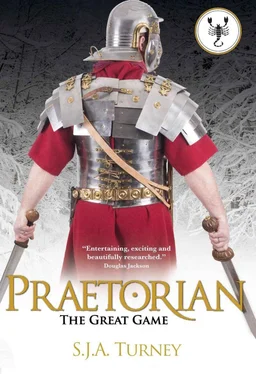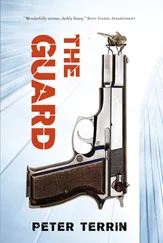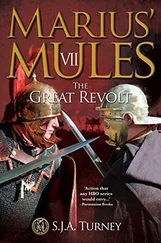S.J.A. Turney - The Great Game
Здесь есть возможность читать онлайн «S.J.A. Turney - The Great Game» весь текст электронной книги совершенно бесплатно (целиком полную версию без сокращений). В некоторых случаях можно слушать аудио, скачать через торрент в формате fb2 и присутствует краткое содержание. Год выпуска: 2015, Издательство: Mulcahy Books, Жанр: Исторические приключения, на английском языке. Описание произведения, (предисловие) а так же отзывы посетителей доступны на портале библиотеки ЛибКат.
- Название:The Great Game
- Автор:
- Издательство:Mulcahy Books
- Жанр:
- Год:2015
- ISBN:нет данных
- Рейтинг книги:4 / 5. Голосов: 1
-
Избранное:Добавить в избранное
- Отзывы:
-
Ваша оценка:
- 80
- 1
- 2
- 3
- 4
- 5
The Great Game: краткое содержание, описание и аннотация
Предлагаем к чтению аннотацию, описание, краткое содержание или предисловие (зависит от того, что написал сам автор книги «The Great Game»). Если вы не нашли необходимую информацию о книге — напишите в комментариях, мы постараемся отыскать её.
The Great Game — читать онлайн бесплатно полную книгу (весь текст) целиком
Ниже представлен текст книги, разбитый по страницам. Система сохранения места последней прочитанной страницы, позволяет с удобством читать онлайн бесплатно книгу «The Great Game», без необходимости каждый раз заново искать на чём Вы остановились. Поставьте закладку, и сможете в любой момент перейти на страницу, на которой закончили чтение.
Интервал:
Закладка:
A head of short black hair emerged, leaning dangerously far out to view the road ahead. The Praetorian riding alongside carefully stepped his horse left to stay out of the observer’s way. The head turned slowly and examined the route they had just travelled. The tight black locks and bushy black eyebrows above a dark, shadowed chin belonged to Saoterus, one of the cadre of young ‘advisors’ that seemed to flock around Commodus since the death of his father.
Something hit Rufinus softly in the face, drawing his attention back to the present. He blinked. It was a rose petal. Handfuls of them, red, white, pink and yellow, were being cast onto the column by the people.
They were in Rome proper, marching between the crude housing of the poor at the edge of the city, packed along the roadsides, heedless of the ancient tombs that stood between them. The gate towers loomed ever closer, almost beckoning, now, beyond them structures looming from unknown heights.
Clearly, despite Commodus’ fears for the early security of his throne and the five months he had been forced to tarry beyond the Alpes while everything was settled, nothing untoward had happened in the city and the people loved and welcomed their emperor, his guard and entourage with joy.
The noise in the outskirts of Rome, the area that had once been the sacred Campus Martius, continued to boom and wash over the column as they approached the heavy gate. The city had expanded so thoroughly beyond the ancient walls that many houses had been built directly up against them, using the heavy, cyclopean blocks as one side of the structure. But here at the gate a space had been left outside, which Rufinus could imagine was usually filled with beggars, stallholders, thieves and the ranting lunatics that occupied every city.
Not today, though. With the people of Rome held at bay by private forces of barely-controlled thugs, this open space was filled by a throng of figures in togas, mostly with broad purple stripes.
Rufinus gawped.
The senators of Rome had come out to welcome their new emperor.
VII – The wonders of Rome
THE din of the extramural crowd and the intonations of loyalty by the nervous senators in the square outside the Porta Fontinalis died away, muffled by the walls. Passing beneath the once-great defences, it had become apparent just how useless they were from a protective angle. The parapet was gone from much of the visible circuit; hardly a stretch of wall visible due to its reuse as the structural faces of modern housing. In places the walkway along the top had fallen away, leaving dangerous sections teetering over houses that stood blissfully unaware beneath.
The gate itself was nothing more than a large, slightly misshapen hole in the wall with no portals to close, graffiti covering the stonework extolling the virtues of one prostitute or another, casting aspersions on the masculinity of certain youths, or simply defacing the stone for the love of writing filth.
His first impressions of Rome had been informed simply by the press and busyness of the outskirts. He commanded a rough geography of the city, passed down from his father on wintry nights when the seemingly uncrossable gulf between them had been narrowed by the same unwatered wine that loosened the old man’s tongue and made him maudlin about the days of his youth. From what he remembered of his father’s words, the Campus Martius was home to some of the great monuments of the city: reminders of great men. The Baths of Agrippa, the Pantheon of Hadrianus, the Mausoleum of Augustus, the stadium of Domitianus; wonders too many to recount.
And he’d seen nothing of such symbols of imperial majesty. All he’d been able to lay eyes on outside the gate had been endless housing and shops, high insulae and narrow streets. And the dilapidated state of the once grand gate had done nothing to improve his impression.
Then the column had passed from under the dark arch, the clip-clop of the horses’ hooves echoing deafeningly, into the bright sunlight of the heart of Rome. The route they had taken had brought them through the gate that stood closest to the centre of imperial power and they entered the city already at its core.
He gaped, his head turning this way and that. The men around him seemed merely relieved or bored, but then they had been stationed here before. None of this was new to them.
A street ran left, jumbled housing separating it from the wall. At the far end, a great curved structure stretched left to right, cutting through the city walls where. A massive carved column rose beyond, a gleaming bronze statue atop that could only be the great Traianus.
To the right, ramshackle brick insulae crowded the street, small stairways running up between them granting access to another row that stood above the first on the slope of the Capitoline, more beyond that, and more, towering over him until, at the top, rocky cliffs gave way to buttressed substructures of the grand, columned temple of Juno. Even the rear view of that most sacred place was breathtaking, framed in painted marble against the cloudless blue sky. Rufinus checked his horse, which was drifting left with his lack of attention.
‘Keep your eyes on the Argentarius!’ hissed Mercator.
‘The what?’
‘The road, you prat.’
Flushing slightly, Rufinus watched Rome unfold in splendid glory. The road they followed, worn flags uneven from centuries of use, followed the curve of the Capitoline hill, grand structures springing up to left and right. His father had verbally mapped the city many times, but his lectures were now mere words lost in the mists of memory. Marvels lay everywhere.
To the left, myriad stores in the arches of an arcade sold everything imaginable in a welter of colours and smells, from expensive Arabian frankincense to pungent German beer in heavy kegs; silks traded across the mountains of Parthia from the farthest reaches of the world, to jars of fish sauce imported from Hispania. Every arch had its merchant bellowing his wares, most pausing to cheer or stare as the imperial cavalcade passed by, before raising their voice to promote their goods once more.
To the right, the hillside veered away, staircases climbing between temples that rose halfway to the sky, bright and richly painted, on a scale that made the great provincial forum of Tarraco look like a barbarian village. The Clivus Argentarius opened out into a great square surrounded by public buildings, each one more magnificent than the last. Despite his noble roots from this very city, Rufinus had never felt more like a country bumpkin.
Across the forum with its soaring columns supporting gilded statues of generals, emperors and heroes of Rome, the cavalcade rumbled, passing on along a wide thoroughfare full of people who hurried to the shelter of the surrounding buildings as they passed. A circular temple bore all the hallmarks of a Vestal shrine, the smoke of the eternal flame twirling from the centre of the roof into the cerulean blue. Behind it: a massive, palatial structure that could only be the residence of the Vestal priestesses.
It was hard not to ogle like an idiot. A few moments further and the column turned right at a crossroads, marked by a grand triumphal arch, and up a long slope. Here, the crowds thinned out and the column ascended slowly, wagons slowing the pace due to the gradient. Gradually, the emperor and his escort reached the crest of the great hill and came to a halt in an open space surrounded by buildings every bit as high and impressive as the temples and basilicas of the forum.
As the column assembled and the men sat stiff, straight and formal, horses whinnying and snorting, sweating and shuffling, Rufinus became aware of a number of Praetorians on duty at doorways and gates. Given the grandeur of the great portal ahead, there was no doubt in Rufinus’ mind that this was the palace that had been home to Marcus Aurelius during his brief sojourns in the city and would now be the residence of Commodus.
Читать дальшеИнтервал:
Закладка:
Похожие книги на «The Great Game»
Представляем Вашему вниманию похожие книги на «The Great Game» списком для выбора. Мы отобрали схожую по названию и смыслу литературу в надежде предоставить читателям больше вариантов отыскать новые, интересные, ещё непрочитанные произведения.
Обсуждение, отзывы о книге «The Great Game» и просто собственные мнения читателей. Оставьте ваши комментарии, напишите, что Вы думаете о произведении, его смысле или главных героях. Укажите что конкретно понравилось, а что нет, и почему Вы так считаете.












